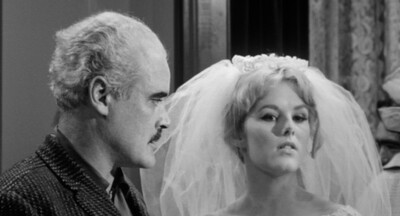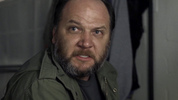
Dementia 13
Carl Rivers • Jun 10 2021- If you didn't see the axe murderer coming, you didn't notice Roger Corman's name in the credits.
- Horror, Thriller
- Released in 1963
- Directed by Francis Ford Coppola
- Written by Francis Ford Coppola, Jack Hill (second unit written by)
- Starring William Campbell, Luana Anders, Bart Patton, Mary Mitchel
- Length: 75 min
- Rating: Unrated
Louise and her husband John are visiting John's family estate in Ireland. One night, John decides to take a rowboat on the estate's pond. Louise joins him out of concern for his poor health. Her concern has a selfish motivation. If John dies before his mother, Louise loses her stake in the family inheritance. Sure enough, John dies of a heart attack in the middle of the pond. Louise resolves this dilemma by dumping his body in the water and convincing his family that he went on a trip.
Dementia 13 shows some early promise thanks to Coppola's solid direction. Unfortunately, the preposterous script eventually sinks it.
Back at the family estate, we meet the rest of the cast: Lady Halloran, the mother; Billy and Richard, John's brothers; Kane, Richard's fiancee; and Dr. Caleb, who's taken charge of treating the mother's deteriorating physical and mental health. The family reunion is punctuated by a morbid anniversary. Richard and Billy had a sister, Kathleen, who drowned in the pond twenty years ago. Lady Halloran holds a memorial at her grave. Conveniently, the grave is only a few yards away from the house.
Louise devises a scam that exploits Lady Halloran's interminable grief. She claims to sense the presence of Kathleen's ghost on the estate and predicts Kathleen will soon try to communicate with them. That night she sneaks out to the pond to MacGyver a message from beyond. Her plot is interrupted by the sudden arrival of a previously unmentioned axe murderer. This is a Roger Corman production, so that wasn't completely unexpected.
This is about when the plot goes completely off the rails. The killer makes short work of a poacher who stumbles across Louise's body. The mother finds a life-size wax doll that she mistakes for Kathleen. The killer appears and frightens her into a coma. With Louise and John missing, strange and possibly paranormal events occurring around the estate, and Lady Halloran on the brink of death, Richard and Kane decide this is the perfect time to schedule an impromptu wedding. Dr. Caleb seems to be the only person at the estate who wants to figure out what the hell is happening here.
The ending doesn't have a plot twist so much as it has a foregone conclusion. The killer is not only the first person you suspect, it's the only person the movie gives us reason to suspect. The mystery that keeps you watching is the question of how Coppola will make all these disparate puzzle pieces fit together. The answer is barely. They barely fit together, and Coppola had to break off a few sharp edges to jam them in place. We're supposed to believe that the wax doll is so realistic, everyone who sees it thinks it's a person. It's so convincing, you'd swear you just saw it blink. Never mind the fact that it's still pristine after spending several years at the bottom of the pond. Impressive, considering Madame Tussaud's best work turns into Swamp Thing if it comes within ten feet of a hot beverage.
Problems aside, Dementia 13 is a notable step above the usual Corman schlock. Call it schlock with panache. Coppola puts the gothic setting to good use. The opening includes a nice shot of John's body sinking to the bottom of the pond. The cast is adequate, if unremarkable. The film's biggest problem remains the script. The end result is a pale imitation of Hitchcock. It's a hack job, but it provides a few notable hints of Coppola's burgeoning talent.
Apropos of the period, Corman's original release included a gimmicky prologue with a "D-13 test" to determine if the audience was psychologically healthy enough to withstand the movie. It consisted of questions like, "Have you ever been hospitalized in a locked mental ward, sanitarium, rest home or other facility for the treatment of mental illness?" A more effective test would have asked a single question: "Have you ever demanded a refund from a movie theater?"
6 out of 10.
Seen on Plex.
Share This Review






